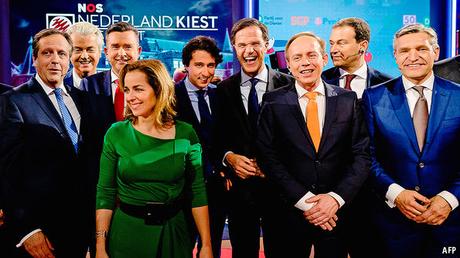
IT WAS supposed to be the kick-off of Europe's year of populism. For months, analysts had speculated that Geert Wilders, the platinum-blond rabble-rouser who calls for the Netherlands to shutter its mosques and quit the European Union, might come first in the Dutch election, portending smashing wins for anti-Muslim Eurosceptics across the continent.
It did not happen. On March 15th the Dutch delivered a vote of confidence in the competent centre-despite a last-minute diplomatic clash with Turkey that featured riots in Rotterdam and wild allegations from Recep Tayyip Erdogan, Turkey's president. After the Netherlands blocked Turkish ministers from visiting to campaign for a Turkish referendum among Turkish-Dutch dual citizens, Mr Erdogan called the Netherlands a "Nazi remnant", barred its ambassador and bizarrely accused the Dutch of the massacres of Bosnian Muslims in Srebrenica in 1995.
Mark Rutte (pictured, third from right), who has been prime minister since 2010, was always the likeliest candidate to form the country's next government. With 95% of votes counted when The Economist went to press, his Liberal...
The Economist: Europe

